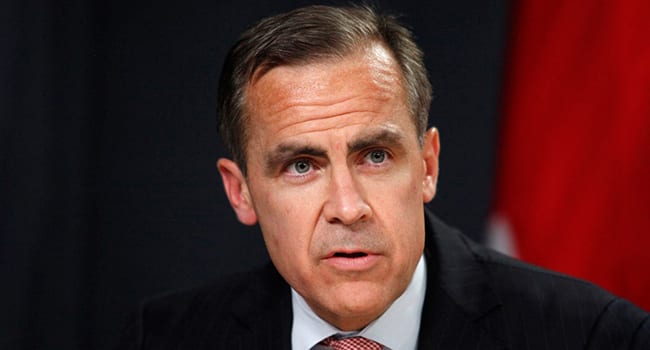 Canadian economist Mark Carney is stepping down as the governor of the Bank of England, to be replaced by Andrew Bailey in March. So it’s fitting to look at how his anti-Brexit bias and activism have damaged his legacy.
Canadian economist Mark Carney is stepping down as the governor of the Bank of England, to be replaced by Andrew Bailey in March. So it’s fitting to look at how his anti-Brexit bias and activism have damaged his legacy.
Anybody actively involved in the Brexit debate is certain to hold strong opinions about Carney, as well as his retirement. Brexit supporters see this as a victory and a relief, while those who wish the United Kingdom to remain in the European Union are no doubt nervous to see someone so vocally on their side saying goodbye.
Carney leaving is the death knell of the Remain movement, after Conservative Boris Johnson won a decisive majority in the December general election that has allowed him to finally deliver Brexit.
Canadians may see Carney as a stabilizing figure. As governor of the Bank of Canada from 2008 to 2013, he was a steady, moderate, reasoned force that kept the country afloat during a turbulent economic time. Political bias didn’t really come into play.
But political bias did come in to play during Brexit discussions, so much so that Carney was looked upon by many as a political activist.
Throughout the campaign to leave the European Union and after the U.K. voted to leave in 2016, Carney and the Bank of England issued multiple warnings and forecasts that have proven to be wrong or grossly exaggerated.
In 2016, Carney started what felt like a scare campaign about the economic impacts of Brexit. In spring, before the referendum, he announced that the Bank of England would offer banks billions of pounds to avoid a financial crisis following the Brexit vote. Carney also suggested that voting to leave the European Union would result in major financial services quitting London. In a service economy, with London a major financial services hub, this was a hugely significant prediction.
He even suggested Britain would lose influence over regulations and that there would be a “reduction in financial stability.”
He made it very clear that he endorsed former prime minister David Cameron’s EU reform proposals. Despite claiming that the Bank of England would not tell people how to vote, he stated that Cameron’s deal reinforced the “positive impact of EU membership.”
In May 2016, he doubled down on his suggestion that the U.K. faced the very real possibility of a recession for even voting for Brexit. Speaking to the Treasury Select Committee, he said, “Brexit, to my mind, would have a material impact on growth and inflation. It would be likely to have a negative impact in the short term.”
In November 2018, the Bank of England published an analysis that suggested leaving the EU without a deal in place would result in gross domestic product contracting by eight per cent in one year. This wild and unrealistic prediction was later walked back.
Ultimately, his predictions that the sky would fall failed. The British people voted to leave the European Union and the consequent scare tactics from the Remain side in the years following the referendum did nothing but reinforce the public desire to leave the EU.
After three years of the politicians trying to cancel or frustrate Brexit, Johnson has withdrawn the U.K. from the European Union.
The scare stories are being proven wrong already and even Bank of England chief economist Andrew Haldane admitted that the economics profession was in “crisis” after making misjudgments about the impact of Brexit. Not only did a recession not take place, their prediction that the economy would stagnate in the second half of 2016 was incorrect (it grew 0.6 per cent in the third quarter).
Not only has Carney been wrong at virtually every turn, Britain’s economy has done well despite uncertainty about Brexit and what form it would take. The economy grew faster than expected during the 2019 third quarter and the European Commission projects United Kingdom GDP growth to stay at about 1.3 per cent in 2020. Employment has reached record highs.
And following Johnson’s election victory, polls show the highest business confidence levels in the U.K. in three years.
Carney’s biases clearly got the better of him. The positive future the British people voted for in 2016 is being delivered and Carney leaves his post with only disappointed Remainers sad to see him go.
Jack Buckby is a research associate with the Frontier Centre for Public Policy and a British author and researcher, with experience working in English, American, Canadian and Polish media. His last book, Architects of Betrayal, explores the disastrous European Union exit withdrawal negotiations under the leadership of former prime minister Theresa May.
Jack is a Troy Media Thought Leader. Why aren’t you?
The views, opinions and positions expressed by columnists and contributors are the author’s alone. They do not inherently or expressly reflect the views, opinions and/or positions of our publication.


